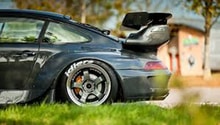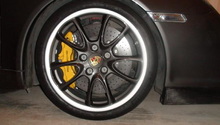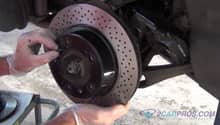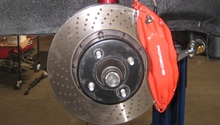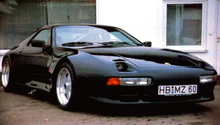Porsche 928: Why Do My Brakes Squeak?
Whether they are hurting your ears or your ego, squeaky brakes are one of the last things you want for your pride and joy. Luckily, it's an easy fix.
This article applies to the Porsche 928 (1979-1995).
You wash it and wax it, you treat it to the best parts and service money can buy, and you have more products on the shelf to take care of it than you do to take care of yourself. Then you take it out for a drive, and how does it repay you? With annoying, embarrassing, squeaky brakes. No need to hide from the shame; fixing the noise can be very easy and even...dare we say...fun?

Materials Needed (some optional)
- Jack and jack stands
- Wheel lug wrench
- Torque wrench
- High-pressure hose or steam cleaner
Step 1 – Check the pads
They could be getting low.
Many pads have what are referred to as "squealers." These are small steel springs that point at the rotor, manufactured to touch the rotor once the pad thickness gets low. When they touch, they vibrate and make a horrible screech, letting you know it's time for a brake job. The first and most important step is to verify that your squeal isn't coming from worn out pads.
If the pads check out, it could be worth it to apply some high-temp brake grease to the pad's backing plate where it touches the pistons, and to the sliders that hold the pad in place. Noise comes from vibrations: stop the vibrations, stop the noise.
(Related Article: Porsche 928: How to Replace Brake Pads/Calipers/Rotors - Rennlist.com)

Step 2 – Clean the rotors
Dust buildup can cause noise.
Your pads are designed to work with a nice clean contact between the pad surface and the steel rotor. If there is a buildup of brake dust that is interfering with this contact, it can lead to pad vibrations and squealing, as well as a decrease in braking performance. The solution? Get a high-pressure hose or steam cleaner (or use one at a DIY car wash) and blast the dust off of the rotors. Make sure to roll the car to get the area hidden by the caliper. Drive the car to dry them off, and the noise could very well be fixed.

Step 3 – Get them hot
A nice heat cycle could be just the thing.
Porsche owners in Germany never seem to have squeaking brake issues. Why? Because they get the brakes much hotter than we do, driving on the Autobahn. Stop-and-go in US traffic never gets the brakes up to temp; rather, it just adds brake dust and deposits to the rotors which can build up and become problematic over time. The pad surface can also become hard and glazed, resulting in noise and loss in performance.
The best (and most fun) solution is to get some serious heat in the brakes. In a safe place, get the car up to speed, somewhere between 40 and 60 MPH, and get on the brakes hard. Activate the ABS if you have it (but don't lock the wheels if you don't). Do this several times in a row until you can smell the brakes getting hot. This will de-glaze the pads, burn off deposits, and clean out brake dust, resulting in a quieter, better-performing braking system.

Related Discussion
- Squealing Brakes - Rennlist.com


